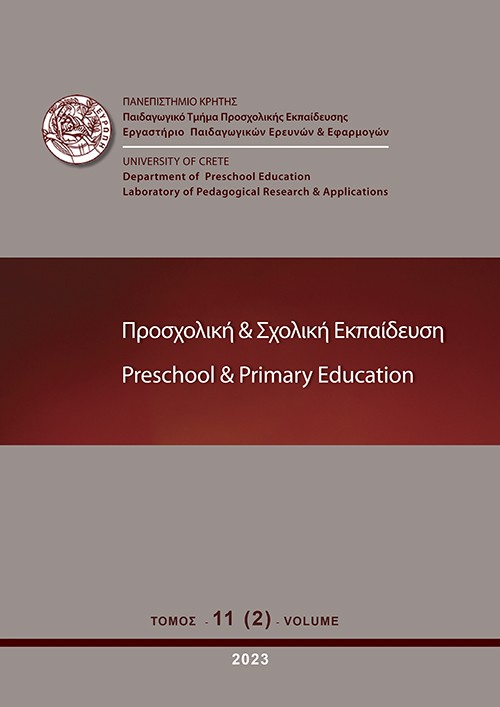Μεταβάσεις της πρωτοσχολικής ηλικίας στην ψηφιακή εποχή: Συνέχειες και ασυνέχειες στις πρακτικές γραμματισμού

Περίληψη
Η παρούσα εργασία παρουσιάζει τα αποτελέσματα έρευνας που αφορά τις δυνατότητες και τις προοπτικές του ψηφιακού μαθησιακού περιβάλλοντος για τη διασφάλιση της εκπαιδευτικής και μαθησιακής συνέχειας. Συγκεκριμένα, μελετώνται οι απόψεις των εκπαιδευτικών πρωτοσχολικής ηλικίας για τις πρακτικές γραμματισμού που έλαβαν χώρα στην προσχολική εκπαίδευση κατά τη διάρκεια της πανδημίας στο πλαίσιο των ψηφιακών τάξεων. Οι απόψεις για τις πρακτικές αυτές ιδωμένες στο συγκείμενο διασφάλισης των συνθηκών συνέχειας των προγραμμάτων για την ομαλή μετάβαση των παιδιών από το νηπιαγωγείο στο δημοτικό σχολείο διερευνώνται με τη χρήση της ποιοτικής μεθόδου έρευνας, με ημιδομημένες συνεντεύξεις σε νηπιαγωγούς και δασκάλους της πρώτης τάξης του δημοτικού σχολείου. Τα αποτελέσματα της έρευνας έδειξαν ότι νηπιαγωγοί και δάσκαλοι συγκλίνουν ως προς την άποψη ότι η συνέχεια του προγράμματος νηπιαγωγείου και δημοτικού σχολείου δε φαίνεται να μπόρεσε να υποστηριχτεί από τις νηπιαγωγούς την περίοδο της εξ αποστάσεως εκπαίδευσης. Αν και οι νηπιαγωγοί, αποπειρώμενες να προσεγγίσουν ισόρροπα διάφορες εμπειρίες προφορικού λόγου, ανάγνωσης και γραφής, με πρακτικές ικανές να διατηρήσουν το νήμα της συνέχειας από τη μια βαθμίδα στην άλλη, δε φαίνεται να είχαν τα προσδοκώμενα αποτελέσματα στο πλαίσιο της ψηφιακής τάξης. Τέλος, τα ευρήματα της παρούσας εργασίας υποδεικνύουν την ανάγκη διεύρυνσης της έρευνας, προκειμένου να αναδειχθούν πρακτικές ενίσχυσης του γραμματισμού στην κρίσιμη πρωτοσχολική ηλικία και δη στο πλαίσιο ιδιαίτερων εκπαιδευτικών συνθηκών, όπως είναι αυτή της ψηφιακής εποχής που διαμορφώθηκε εξαιτίας της πανδημίας Covid-19.
Λεπτομέρειες άρθρου
- Πώς να δημιουργήσετε Αναφορές
-
Αποστόλου Ζ. (2023). Μεταβάσεις της πρωτοσχολικής ηλικίας στην ψηφιακή εποχή: Συνέχειες και ασυνέχειες στις πρακτικές γραμματισμού . Preschool and Primary Education, 11(2), 154–179. https://doi.org/10.12681/ppej.31444
- Ενότητα
- Άρθρα

Αυτή η εργασία είναι αδειοδοτημένη υπό το CC Αναφορά Δημιουργού – Μη Εμπορική Χρήση – Παρόμοια Διανομή 4.0.
Οι συγγραφείς των άρθρων που δημοσιεύονται στο ΠΡΟΣΧΟΛΙΚΗ & ΣΧΟΛΙΚΗ ΕΚΠΑΙΔΕΥΣΗ διατηρούν τα δικαιώματα πνευματικής ιδιοκτησίας επί των άρθρων τους, δίνοντας στο περιοδικό το δικαίωμα της πρώτης δημοσίευσης. Άρθρα που δημοσιεύονται στο ΠΡΟΣΧΟΛΙΚΗ & ΣΧΟΛΙΚΗ ΕΚΠΑΙΔΕΥΣΗ διατίθενται με άδεια Creative Commons 3.0 και σύμφωνα με την άδεια μπορούν να χρησιμοποιούνται ελεύθερα, με αναφορά στο/στη συγγραφέα και στην πρώτη δημοσίευση για μη κερδοσκοπικούς σκοπούς και με δικαίωμα τροποποίησης μόνον με παρόμοια διανομή (αν αναμείξετε, τροποποιήσετε, ή δημιουργήσετε πάνω στο υλικό, πρέπει να διανείμετε τις δικές σας συνεισφορές υπό την ίδια άδεια όπως και το πρωτότυπο). To Εργαστήριο Παιδαγωγικών Ερευνών και Εφαρμογών του Παιδαγωγικού Τμήματος Προσχολικής Εκπαίδευσης του Πανεπιστημίου Κρήτης και το Εθνικό Κέντρο Τεκμηρίωσης διατηρούν το δικαίωμα να δημοσιεύουν, να αναπαραγάγουν, να παρουσιάζουν στο κοινό, να διανέμουν και χρησιμοποιούν άρθρα που δημοσιεύονται στο ΠΡΟΣΧΟΛΙΚΗ & ΣΧΟΛΙΚΗ ΕΚΠΑΙΔΕΥΣΗ σε οποιοδήποτε μέσο και μορφή είτε μεμονωμένα είτε ως μέρη συλλογικών έργων, για όλο το χρόνο διάρκειας προστασίας της πνευματικής ιδιοκτησίας και για όλες τις χώρες του κόσμου. Αυτό περιλαμβάνει ενδεικτικά και όχι αποκλειστικά, το δικαίωμα δημοσίευσης των άρθρων σε τεύχη του περιοδικού ΠΡΟΣΧΟΛΙΚΗ & ΣΧΟΛΙΚΗ ΕΚΠΑΙΔΕΥΣΗ, αναπαραγωγής και διανομής μεμονωμένων αντιγράφων των άρθρων, αναπαραγωγής ολόκληρων των άρθρων σε άλλη έκδοση του Εργαστηρίου Παιδαγωγικών Ερευνών και Εφαρμογών του Παιδαγωγικού Τμήματος Προσχολικής Εκπαίδευσης του Πανεπιστημίου Κρήτης και του Εθνικού Κέντρου Τεκμηρίωσης και αναπαραγωγής και διανομής των άρθρων ή περίληψης αυτών με χρήση πληροφορικού συστήματος αποθετηρίου.


